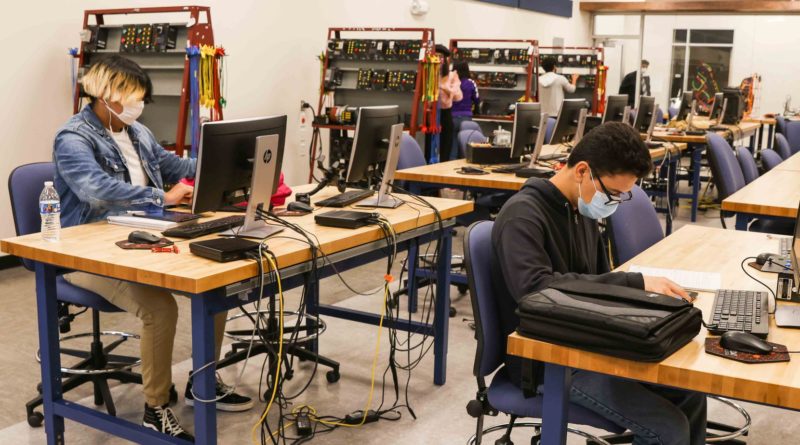Programs Provide Students with Skills to Enter the Workforce after High School Graduation.
When area high school graduates celebrate the end of a challenging year in June, these five Dallas seniors already will be two weeks into their full-time, paid internships at Texas Instruments.
Aaron Barrientos, 17, will study electrical engineering at the University of Texas at Arlington alongside his work diagnosing problems or cleaning the machines at Texas Instruments. Doing both opens up even more opportunities, he said.
“Now I know I can do the internship and college at the same time,” Barrientos said.
The students’ jobs represent the final steps of their early college program at H. Grady Spruce High School, where they focused on mechatronics.
The program prepares students for careers that involve engineering, mechanics and electronics. Graduates may work at jobs diagnosing mechanical issues at manufacturing plants or help automate the shipping and distribution systems for major companies, such as Walmart.
In Texas, a small but growing number of students are obtaining associate degrees and industry certifications through programs like the one at Spruce.
In 2018-19, nearly 2% of graduating seniors — about 7,100 students — obtained their associate degree and 10.7% of students earned an industry-based certification, according to the most recent state data. The number of students obtaining both their associate degree and industry-based certifications more than doubled over two years prior.
Spruce’s program, a partnership between DISD and Dallas College Eastfield Campus, has led to job offers and livable wages for the majority of its graduates since the early college program’s inception. This year, Texas Instruments offered six-month internships to all of the program’s graduating seniors.
The seniors start right after high school and are paid a generous salary for 17- and 18-year-olds entering the workforce — $40,000 a year. They could also qualify for a $10,000 raise and a full-time job offer within six months, said Russell “Rusty” Dale, one of the program’s instructors.
Demand is growing for skill-focused programs because of student interest and companies’ need for talent. That’s pushed more Texas school districts to invest in career and technical education. Just this year, Dale helped launch a mechatronics program in Garland and is working to do the same in Mesquite very soon.
Grand Prairie is among the most enthusiastic adopters of career and technical education, offering nearly 30 pathways, including architecture, dentistry, automotive technology and culinary arts.
The school district works with a demographer to plot out which industries will have the most growth and which jobs will offer livable wages. GPISD officials recently opened a cybersecurity and computer science pathway and are exploring a travel and tourism program as a result of that research.
“We are providing opportunities for students and their families if they don’t want to go to college,” said Aniska Douglas, the district’s director of career and technical education. “It’s generational, right? Once they obtain a skill set in a job, you know their kids and their kids’ kids are going to aim for that same goal as well.”
Completing one of the pathways doesn’t mean students won’t seek out higher education. Some graduates use their certifications and ensuing jobs as supplemental income while attending college or put the college credit earned in high school to good use at a university.
Grand Prairie Dubiski Career High School senior Faith Ajanaku, for instance, plans to attend Stanford University while working as an emergency medical technician — that is, once she turns 18 and can complete the certification.
“The wonderful thing about getting our certifications is that we can do both [college and our jobs] at the same time,” Ajanaku said.
Several graduates in Spruce’s mechatronics program also hope to balance college classes alongside their internships.
High school senior Katherine Pardo wants to pursue nursing. She is still making college plans but hopes to work as a technician at Texas Instruments while she learns about the medical field.
Even if students end up in different fields, the skills learned in the mechatronics program are transformative, instructor Sheldon Ingersoll said.
Ingersoll completed Eastfield College’s mechatronics program as an adult and began earning nearly $60,000 in his first year out of school. He realized the financial impact the program had in his own life when he replaced his truck’s tires and didn’t have to decide what bill he would forgo paying that month.
Equipping students with those abilities right out of high school is life-changing. “It’s the only way to put it,” Ingersoll said.
Senior Nitza Udave will see an immediate change in her life after she begins her Texas Instruments internship. The starting salary will be more than her mom, a teacher’s assistant, makes.
But graduating from the program and going straight into the workforce will bring more than just monetary benefits to Udave and her family. It will provide a good example for her 9-year-old brother, she said.
“He’s a good student, too, and I just want to be a good role model for him,” Udave said.
Source: https://www.dallasnews.com/news/education/2021/05/30/these-north-texas-high-school-students-graduate-in-june-theyll-already-have-jobs-and-college-degrees/

